
Book Now Partnering in Your Self-Improvement Journey
If you are considering cosmetic surgery to improve your physical appearance and self-image, we invite you to schedule a consultation with our double board-certified Denver plastic surgeon, Dr. Nick Slenkovich. Dedicated to your comfort from your first visit to your final follow-up, the surgeon and staff of Colorado Plastic Surgery Center will always treat you with kindness and caring.
All content on this page was reviewed by Healthcare Chief Operating Officer Stephanie Cooper, MBA, MHA











